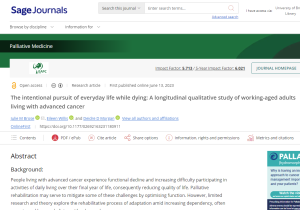Exploring the importance of participating in everyday life while dying
13 June 2023
The adaptations people of working age with advanced cancer make so they can continue participating in everyday life are explored in a paper published in Palliative Medicine. The paper, ‘The intentional pursuit of everyday life while dying’, is from NIHR ARC West’s Dr Julie Brose’s PhD at the Research Centre for Palliative Care, Death and Dying.
Julie talked to eight adults with advanced cancer living in the Rocky Mountains, Canada. The 33 in-depth interviews took place over a 19 month period. They explored how the people had adapted their daily activities so they could continue participating in everyday life, such as working or spending time with family.
She found that people living with advanced cancer try to continue doing what is important to them, albeit in a modified form. This is despite the challenge of unrelenting change and loss as death approaches.
Adapting to functional decline is an active, ongoing process. It occurs through continued engagement in activities. Palliative rehabilitation has a part to play in enabling participation in everyday life.
Dr Julie Brose, Senior Research Associate at NIHR ARC West and the University of Bristol, said:
“It has been such a privilege to talk to these people about the end of their lives and their experiences at such a difficult time. This work shows how important participating in everyday life is to people with advanced cancer.
“Understanding the illness experience of those living with advanced cancer will help healthcare providers better understand what is important to them. Targeted care needs to go beyond symptom management, helping them prioritise participation in valued activities.
“Our findings highlight how insight into the experience of everyday life for working-aged adults living with advanced cancer can inform clinical practice and theory. Quality of life at end of life can be improved through everyday routines.”
Paper
